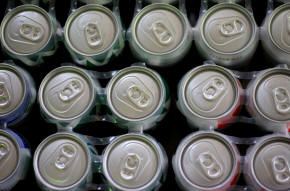Cold beer to your door: brewers in Latin America go direct
 Send a link to a friend
Send a link to a friend
 [May 23, 2022] By
Paulo Lopes and Philip Blenkinsop [May 23, 2022] By
Paulo Lopes and Philip Blenkinsop
SAO PAULO/BRUSSELS (Reuters) - With
COVID-19 lockdowns normalising home delivery of everything from fast
food to aspirin, brewers are tapping into a lucrative new sales format -
delivering cold beer on demand to consumers still gathering at home with
friends even as bars reopen.
For Brazilian Rafael Mazaia, it is cheaper to order beers for delivery
to his home than to drive to the supermarket to pick up a pack and risk
them being tepid when he returns.
"There is no supermarket near my house, I'm too lazy to go to the market
and the drink is not completely cold there, so it is better to order,"
the 24-year-old investment analyst in the Sao Paulo region said.
The world's largest brewer Anheuser-Busch InBev saw orders at its cold
beer service Ze Delivery, launched in its second-largest market Brazil
in 2016, explode during the pandemic from 1.5 million in 2019 to 62
million last year.

In Mexico, its rival Heineken last year launched delivery service GLUP,
also focused on direct-to-consumer cold beer.
Latin America has proved a natural fit for the format, with consumers
typically having limited refrigeration capacity and a shared love of
gathering for events like soccer matches - a particular draw this year
as fans gear up for November's World Cup, the world's biggest sporting
event.
The end of lockdown restrictions has not ended the segment's growth.
"Home has become the entertainment hub, and there's no better way to
reach (consumers) than with direct retailing," said Euromonitor drinks
analyst Spiros Malandrakis
AB InBev Chief Executive Michel Doukeris says e-commerce complements
rather than replaces in-store purchases, citing the example of friends
gathered for a sports match running out of beer.
"Usually people don't go out to buy more beer," he said. "But having the
delivery in 30 minutes allows you to expand the number of occasions for
beer, before people think about opening a bottle of wine or mixing
spirits."
Sales on AB InBev's e-commerce platforms, dominated by Ze Delivery, rose
62% in 2021 to more than $500 million globally.
But crucially, it is not just additional revenue that beer delivery
brings, but also data on who is buying when, and what brands they
select.
That allows companies to tailor marketing to specific consumers, better
manage inventories or trial new products, and get better and faster
feedback than traditional consumer sampling.

Selling straight to the consumer allows brewers to access this level of
detailed data direct for the first time.
"Just the value of that will justify all the investments we make in
direct-to-consumer by themselves," said Doukeris.
LATE TO THE PARTY
Some smaller craft brewers aside, beer has been late to e-commerce
compared with wine and spirits, which currently account for 40% and 42%
of the online alcohol market respectively against an 18% share for beer,
cider, and ready-to-drink beverages combined, according to IWSR drinks
market analysis.
[to top of second column] |

Beer cans are displayed in a store in Ciudad Juarez, Mexico, July
31, 2018. REUTERS/Jose Luis Gonzalez/File Photo

By 2025 however, beer and the others are expected to increase their share to
28%, taking ground from wine and spirits, which are seen retreating to 32% and
40% respectively, in an online alcohol market 66% higher at $42 billion.
Cold delivery is just a part of that, with much of the beer ordered online by
consumers included in a weekly shop, while in developed markets big brewers
focus on selling systems and kegs allowing consumers to pour their own draft
beer.
But AB-Inbev's Ze Delivery-dominated e-commerce platform sales grew at nearly
twice the rate of its direct-to-consumer sales as a whole last year.
"We know that for the majority of categories, they start with a very small
penetration and there is a kind of tipping point when the volume of e-commerce
goes to more than 3 to 4%, then accelerates very, very fast," he said. Brazil
has broken that barrier.
Since the pandemic began, AB InBev has expanded the Ze Delivery model to 10
other Latin American countries, and is now considering other markets outside the
region.
"As we get more maturity in Latin America, for sure we are going to be willing
to evaluate mature markets as well, because we know convenience is something
consumers like," said Pablo Panizza, AB InBev's global head of sales.
The pandemic not only spurred at-home consumption, but also led to the temporary
easing of restrictions that had previously hindered growth.
Some Indian states allowed alcohol sales through food-delivery apps, while a
number of U.S. states also allowed alcohol makers to bypass wholesalers and sell
directly to consumers.

How long the relaxation in India will last is as yet unclear, but a bill in
California will seek to make the temporary easing there permanent.
There are threats to expansion, however, with the prospect of sharply rising
inflation looming, especially in emerging markets. Heineken for one has
recognized that lower disposable income due to high overall inflation could have
an impact on growth at some point.
But beer has a reputation as "cheap entertainment", as former AB InBev finance
chief Felipe Dutra noted during the last financial crisis, and brewers have
managed to increase sales in the first quarter even with higher prices.
That is partly because of the emergence from the pandemic, with even drinkers at
home now likely to have more friends over.
"It's extremely difficult to put this back in the box," said Euromonitor's
Malandrakis. "It's something consumers have started to get used to."
(Reporting by Philip Blenkinsop; Additional reporting by Carolina Pulice in
Mexico City; Editing by Jan Harvey)
[© 2022 Thomson Reuters. All rights
reserved.]This material may not be published,
broadcast, rewritten or redistributed.
Thompson Reuters is solely responsible for this content.
 |